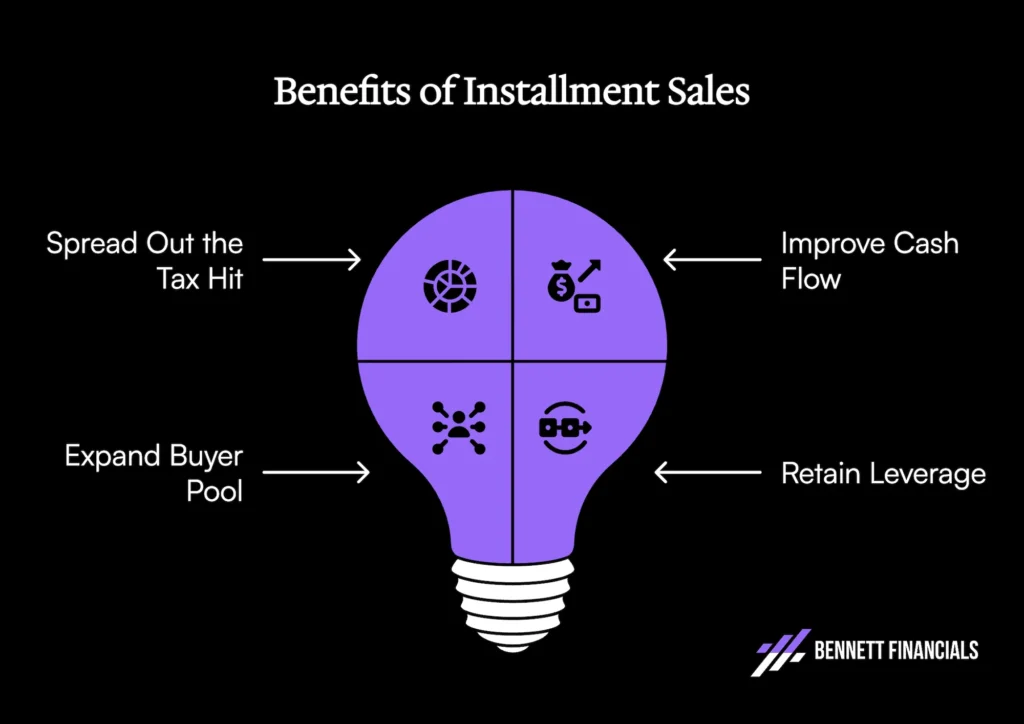Most business owners focus on the headline number when they sell—how much they’re getting paid. But smart sellers? They focus on how the deal is structured. Because how you get paid matters just as much as what you get paid. And that’s where an installment sale can change the game.
This isn’t just a tax deferral tactic—it’s a strategy that can turn a tax liability into a cash flow tool. If you’re selling appreciated real estate, a business, or any large asset, the installment method might keep hundreds of thousands in your pocket today instead of handing it to the IRS.
Let’s break down what it is, how it works, and how to use it the right way.
What Is an Installment Sale?
An installment sale is a sale of property where you receive at least one payment after the tax year of the sale. Pretty simple.
Instead of collecting the full purchase price upfront, the seller agrees to take payments over time—usually with interest. For tax purposes, this means you only recognize gain as the payments come in.
This defers your capital gains tax over the life of the payments. It’s outlined under IRS Section 453, and it’s one of the most overlooked tools in exit planning.
Installment Sale Real Estate Example
Let’s say you’re selling a commercial property for $2 million that you bought years ago for $500,000. That’s $1.5M in gain.
If the buyer pays all cash at closing, you owe tax on the full $1.5M this year. But if you structure it as an installment sale—$400K down, then $200K a year for 8 years—you spread the gain across 8 years. That gives you time to plan your tax bracket, reinvest, or pair with other strategies.
How Does an Installment Sale Work?
Here’s the structure:
- Down payment: Often a chunk up front (negotiable)
- Installments: Payments over time, usually with interest
- IRS Form 6252: This is what tracks your annual gain
- Tax: You pay capital gains only on the principal portion of each payment
Real Estate Installment Sale Considerations
If you’re selling real estate, watch for depreciation recapture. That portion isn’t deferred—it’s taxed in the year of sale.
Interest income is separate and taxed as ordinary income. And if the deal’s value is over $5 million, you may trigger a 453A interest charge—a penalty for deferring too much.
The IRS wants their money. They’ll let you delay it—but not without limits.
Benefits of an Installment Sale
Installment sales aren’t just about kicking the tax can down the road. They can be a powerful move when used with intent.
1. Spread Out the Tax Hit
Deferring gain means you may keep your taxable income in a lower bracket each year. That gives you more control over your annual tax position—and more opportunity to reinvest along the way.
2. Improve Cash Flow
Instead of getting hit with a single, massive tax bill and scrambling for liquidity, you can match tax payments to actual cash received. You’re not paying taxes on money you haven’t seen yet.
3. Expand Buyer Pool
Not every buyer can write a multi-million dollar check. Spreading payments out makes your business or property more accessible—without discounting the price.
4. Retain Leverage
With the right terms, you can secure the deal against collateral and charge interest. That means more cash in your pocket over time—on top of the sale price.

Installment Sale vs. Seller Financing
At first glance, they seem the same—seller gets paid over time. But there are critical differences.
| Feature | Installment Sale | Seller Financing |
| Tax deferral | Yes | Not always (depends on setup) |
| Ownership transfer | At closing | Often delayed |
| Collateral required | Optional | Usually |
| Buyer financing involved | No | Sometimes blended with bank loan |
| Control of terms | High | Shared with lender, if involved |
An installment sale is a tax designation, not a financing method. Seller financing refers more to how the buyer pays—not how the gain is taxed.
For a deeper dive into seller financing structures, check out our guide on Deferred Sales Trusts.
When to Use an Installment Sale
Installment sales work best when:
- You’re selling an appreciated asset with a low basis
- The buyer needs time to pay
- You want predictable cash flow post-exit
- You’re pairing it with other strategies like a Deferred Sales Trust (DST) or Charitable Remainder Annuity Trust (CRAT).
Common Scenarios
- Real estate: Especially commercial or investment properties
- Professional service firms: Selling to partners or internal team
- Family transfers: Kids buying out the business over time
- Partial buyouts: Exit over time, while retaining some control
When You Shouldn’t Use an Installment Sale
Not every deal qualifies. In fact, some of the biggest mistakes happen when people try to force this strategy into deals where it doesn’t fit.
Avoid it if:
- You’re selling inventory or dealer property
- You need all the cash up front
- Buyer has high default risk
- The asset is heavily depreciated – you may trigger recapture all at once.
- You plan to leave the country or die shortly after sale. Installment rules can complicate estate planning.
Also, if the sale is over $5 million and you’re still owed over $5M in future years, IRC 453A can impose interest charges on the deferred tax.
Risks and Pitfalls to Avoid
Here’s where most sellers get burned:
1. Poor Documentation
You need a legally binding contract, clear terms, and proper payment tracking. No handshake deals. The IRS wants proof.
2. Default Risk
You’re the bank now. If the buyer flakes, you may end up repossessing a business or asset – and cleaning up the mess.
3. Interest and Recapture Surprises
Even though gain is deferred, interest and depreciation recapture are taxed right away. A sloppy setup leads to surprise tax bills.
4. Missed Coordination
Installment sales touch tax, legal, and financial planning. If your CPA and attorney aren’t on the same page, you’ll end up exposed.
For strategies to avoid IRS penalties on aggressive tax positions, consider using Form 8275.
How to Structure It Properly
This is where strategy beats speed. Here’s how we do it:
- Set a reasonable down payment
- Define a clear payment schedule
- Charge interest at a market rate (to avoid IRS imputation rules)
- Use collateral or personal guarantees where needed
- File IRS Form 6252 annually
- Keep clean documentation and tax support
Coordinate with your strategic finance team, not just your CPA
Advanced Tax Planning with Installment Sales
Want to get even more out of the deal? Here’s how the top 1% use it:
Pair with a Deferred Sales Trust (DST)
You can sell into a trust, defer recognition, then take distributions over time. This adds asset protection and investment flexibility. Read our article on deferred sales trusts.
Use With Charitable Remainder Annuity Trusts (CRAT)
Offset gain by donating some proceeds, receive income for life, and support a cause, all while lowering tax exposure. Read more on CRATs.
Stack With Entity Planning
Reinvest the income through S Corps, QSSTs, or family partnerships to split income or redirect it strategically.
Tax Bracket Engineering
Design payments so you stay in a lower bracket each year, instead of triggering one large spike.
Exit Planning with Installment Sales
Installment sales aren’t just tax tools, they’re exit tools.
They let you:
- Step away gradually
- Transition leadership over time
- Lock in steady income after the sale
- Defer gain while staying involved
Installments as a Bridge
This isn’t just about deferral, it’s about control. A well-structured installment sale gives you time to plan what’s next. Whether that’s reinvesting, reducing exposure, or building legacy.
For insights on maximizing profit through strategic financial partnerships, read our ProfitCON Recap.
Summary: The Right Strategy for the Right Sale
An installment sale can be a powerful weapon, but only when used correctly.
It works best when:
- You’re selling appreciated assets
- You want to defer tax and maintain cash flow
- You trust the buyer and have strong documentation
- You’re pairing it with broader strategic finance plans
But it’s not one-size-fits-all. And it’s not the right move just because it sounds good on paper. This needs to be planned, modeled, and backed by advisors who see the big picture—not just the tax return.
Before You Sell, Build a Financial Strategy That Holds
If you’re thinking about selling, don’t start with the price. Start with the structure.
A tax-heavy exit can kill your net proceeds. A smart strategy could delay that tax, spread it out, and give you options for what comes next.
That’s what we do.
We help business owners think beyond the transaction to build scalable exits, reduce taxes, and walk away on their terms. Book a strategic consult before you sell.

